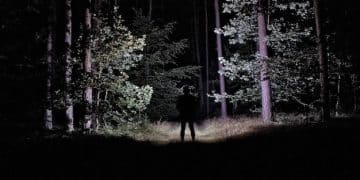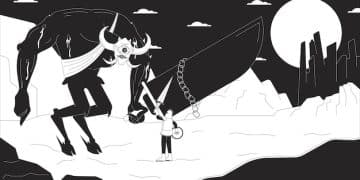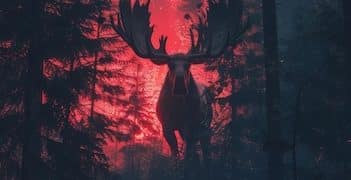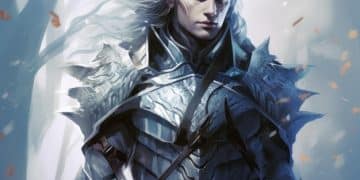The Witcher: Exploring Moral Ambiguity of Monsters and Humans
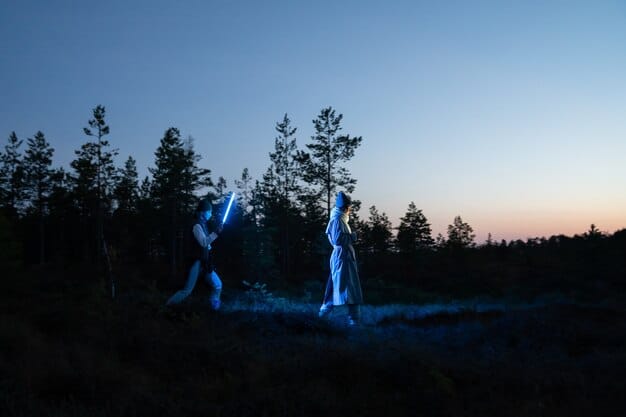
The Lesser Evils in The Witcher universe highlights the complex moral landscape where monsters and humans blur the lines between good and evil, challenging simple definitions of right and wrong.
The world of The Witcher is not one of fairytales and simple morality. Instead, it grapples with the grim reality of choices where no outcome is purely good. This is the essence of the “Lesser Evils: Examining the Moral Ambiguity of Monsters and Humans in the Witcher Universe,” a concept that challenges our understanding of heroism and villainy.
Exploring the Depths of Morality in the Witcher Universe
The Witcher, created by Andrzej Sapkowski, presents a morally gray universe where decisions are rarely clear-cut. This approach to storytelling challenges players and readers to consider the consequences of their choices, adding depth to the narrative. The concept of “lesser evils” is central to this ambiguity.
The Concept of “Lesser Evil”
The phrase “lesser evil” suggests choosing the least harmful option in a situation where all outcomes are negative. In the Witcher’s world, this often means deciding between the interests of humans and monsters, or different factions vying for power.
In the Witcher universe, the line between monster and human blurs, forcing characters and players to confront uncomfortable truths about prejudice, survival, and the nature of evil.
The Moral Compass of Geralt of Rivia
Geralt, as a Witcher, is often forced to make these difficult choices. His neutrality is constantly tested, and he must weigh the potential consequences of his actions. This journey of moral exploration is what makes the Witcher universe so compelling.
- Neutrality is constantly tested.
- Has to weigh the potential consequences of actions.
- Moral exploration makes the universe compelling.
Geralt’s decisions resonate with players and readers because they showcase the complexity of morality in a world where easy answers are rare, and every choice carries weight.
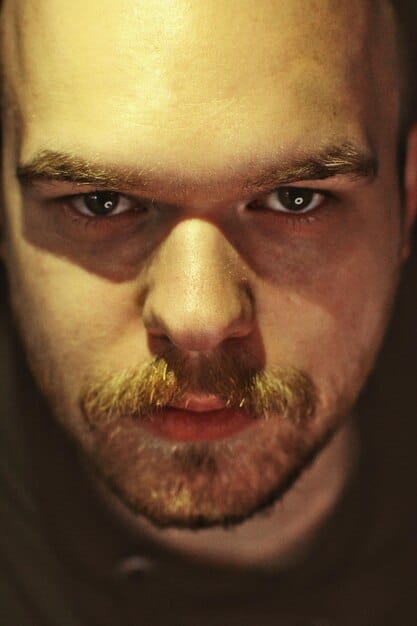
Humanity’s Dark Side: Prejudice and Moral Decay
The Witcher’s moral landscape is not solely defined by monsters. Humans, driven by prejudice, greed, and power, often display a darker side than the creatures they hunt. This moral decay within human society is a recurring theme throughout the series.
Prejudice Against Non-Humans
Humans in the Witcher universe exhibit pervasive prejudice against non-humans, including elves, dwarves, and other sentient races. This ingrained bias motivates violence, discrimination, and systemic oppression, contributing to the world’s complex moral framework.
The novels and games depict non-human characters facing rampant discrimination and persecution, highlighting the dark underbelly of human society. This prejudice drives conflict and shapes the moral choices of key characters.
The series examines how fear and ignorance can lead to the dehumanization of others, ultimately revealing a profound moral failing within human society.
- Exhibits pervasive prejudice against non-humans.
- Motivates violence and discrimination.
- Dehumanization of others.
Humans, in their quest for dominance, often commit atrocities that rival the most gruesome acts of the monsters they fear, showcasing a disturbing parallel between the two.
Monsters with Morals: Challenging Perceptions
The Witcher challenges the traditional fantasy trope of monstrous creatures being inherently evil. Not all monsters are mindless beasts, and some display a level of sentience and morality that rivals—or even surpasses—that of humans.
Sentient Monsters and Their Stories
The Witcher bestiary includes numerous sentient monsters with complex motivations. Some creatures, such as the higher vampires and intelligent trolls, exhibit a range of emotions, desires, and moral codes.
These creatures often have compelling reasons for their actions, whether driven by survival, revenge, or the protection of their own kind. Their stories humanize them, blurring the line between monster and sentient being.
Interactions with these monsters often force Geralt and players to reconsider their preconceived notions about good and evil, adding layers of complexity to the narrative.
The Moral Agency of Monsters
By giving monsters moral agency, the Witcher universe challenges the traditional fantasy trope of inherently evil creatures. Some monsters display a code of ethics, showing mercy or even kindness in certain situations.
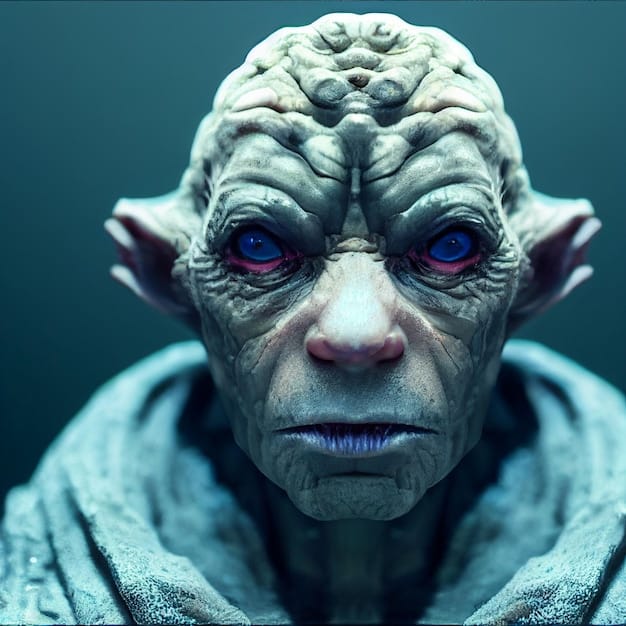
Characters like Regis, a higher vampire, demonstrate that monsters are not inherently evil but capable of moral growth and even friendship. This challenges the notion that monsters are simply creatures to be slain.
Giving monsters moral agency enriches the narrative and forces players to consider the complexity of their choices beyond simple notions of heroism and villainy.
- Challenges the traditional fantasy trope.
- Monsters display a code of ethics.
- Monsters aren’t inherently evil.
Not all monsters are mindless beasts. Some display a level of sentience and morality that rivals, or even surpasses, that of humans, turning morality on its head.
The Price of Neutrality in a Chaotic World
Geralt’s attempts to remain neutral often lead him to confront the harsh realities of a world driven by conflict and self-interest. This neutrality is constantly tested, and he must grapple with the consequences of his decisions.
The Illusion of Neutrality
In the Witcher’s world, true neutrality is often an illusion. Choosing not to take sides can have profound consequences, allowing injustice and suffering to continue unchecked. Remaining neutral may not absolve one of moral responsibility.
Geralt’s commitment to neutrality is frequently challenged as he witnesses the suffering of innocent people and the injustices perpetrated by powerful factions. This tension forces him to reassess his values and consider the moral implications of his inaction.
The series raises questions about whether neutrality is a viable moral stance in a world where good and evil are constantly at odds.
- True neutrality is often an illusion.
- Choosing not to take sides has consequences.
- Should Geralt reassess his values.
Geralt’s attempts to remain neutral often result in unintended consequences, forcing him to confront the moral dilemma of choosing the lesser evil.
Moral Dilemmas and Player Agency
The Witcher games are renowned for presenting players with difficult moral choices that have far-reaching consequences. These choices often lack easy answers, compelling players to consider the nuances of each situation.
Consequences of Choice
The Witcher games are structured around player agency, offering meaningful choices that impact the narrative and character relationships. Consequences can range from minor alterations in dialogue to significant changes in the game’s ending
Players must reconcile their personal moral compass with the harsh realities of the Witcher’s world, often leading to unexpected outcomes. These often force tough decisions where there is no good choice.
The game’s emphasis on consequences underscores the importance of ethical decision-making and encourages players to reflect on their actions.
The Impact of Decisions
The consequences of choices in the Witcher games are not always immediately apparent, adding to the sense of moral ambiguity. Decisions can have ripple effects that alter the course of the game.
Players must live with the consequences of their choices, whether they lead to positive outcomes or tragic results. This reinforces the sense that every decision matters in the Witcher universe.
By presenting players with complex moral dilemmas and meaningful consequences, the Witcher games create a compelling and immersive experience that challenges traditional notions of player agency.
- Meaningful choices impact the narrative.
- Unexpected outcomes from decisions.
- Reinforces that every decision matters.
The player is left to decide the fate of characters, races, and even entire kingdoms, all while wrestling with the moral implications of their actions.
The Witcher’s Enduring Appeal: Why Moral Ambiguity Matters
The Witcher’s moral ambiguity is a key factor in its enduring appeal. It challenges simplistic notions of good and evil, prompting players and readers to engage with complex ethical questions.
Realism and Relatability
The Witcher’s exploration of moral ambiguity resonates with audiences because it reflects the complexities of the real world. In life, choices are rarely black and white, and individuals must often grapple with difficult decisions that have no easy answers.
By presenting characters who are flawed, conflicted, and forced to make tough choices, the Witcher creates a sense of realism and relatability that enhances the overall experience.
Audiences appreciate the series’ willingness to delve into the nuances of human nature and explore the gray areas of morality.
Challenging Simplistic Notions
The Witcher challenges simplistic notions of good and evil, encouraging players and readers to think critically about the ethical implications of their actions. It resists the temptation to provide easy answers, forcing individuals to confront uncomfortable truths and make difficult choices.
- Reflects the complexities of the real world.
- Creates a sense of realism and relatability.
- Challenges simplistic notions of good and evil.
The exploration of difficult ethical questions is a vital component, captivating audiences with its refreshing take on the fantasy genre.
| Key Concept | Brief Description |
|---|---|
| 🤔 Moral Ambiguity | Choices aren’t always clear; decisions have complex consequences. |
| 🐺 Geralt’s Neutrality | Tested frequently, showing consequences of moral choices. |
| 👹 Monsters vs. Humans | Blurring lines between good and evil in society. |
Frequently Asked Questions
▼
In The Witcher, ‘lesser evil’ refers to choosing the least harmful option when faced with multiple negative outcomes, often blurring the lines between good and bad decisions.
▼
The morality is ambiguous due to the complex motivations of characters and the consequences of player choices, challenging simple notions of good and evil in a harsh world.
▼
Monsters aren’t simply evil, with some displaying intelligence, emotions, and moral codes comparable to humans, defying traditional fantasy tropes.
▼
Geralt’s neutrality is constantly tested, leading to unintended consequences. He must grapple with the moral implications of his decisions and reassess his values.
▼
Decisions have impactful consequences because they are designed to affect the narrative and character relationships, compelling players to weigh their choices carefully.
Conclusion
The moral ambiguity of The Witcher universe presents a multifaceted exploration of good and evil, challenging players and readers to confront complex ethical issues. By blurring the lines between monsters and humans, the series delivers a refreshingly realistic and thought-provoking narrative, making it a timeless addition to the fantasy genre.
